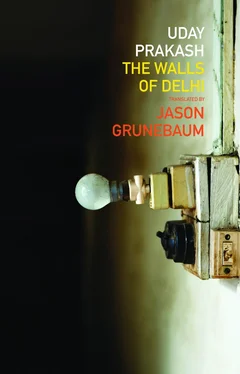‘[T]the most glaring tendency of the British Government system of high class education has been the virtual monopoly of all higher offices under them by the Brahmins.’
(Mahatma Jotirao Phule, ‘Slavery’)
‘The British… validated Brahmin authority by employing, almost exclusively, Brahmins as their clerks and assistants.’
(Arthur Bonner, Democracy in India: a Hollow Shell)
What is the colour of fear? Is it the colour of dirt, or of stone? Is it yellow, charcoal? Or the colour of ash left over from a burning coal — ash that coats the coal still glowing red-hot, that still has its heat! Or a colour that masks a terrifying silence behind it? A small tear that exposes a frightful scream suspended behind.
Have you ever seen the bloodshot, dying eyes of a fish thrown from an ocean or a river, onto a sandy bank or shore? That’s the colour.
The most talented actor, no matter how hard he tries, can’t quite make the whites of his eyes or his pupils imitate the colour you see in the face of a living, breathing man who is scared clear out of his wits. Like a man going home after a hard day’s work, exhausted, satchel in hand, penny candy and cheap toys for his kids in the bag, along with a few pills for his wife’s cough. The man turns the corner into a deserted alley to find himself caught in the middle of a riot — and, unfortunately for him, he’s the wrong religion or race as far as the gang or mob that’s surrounding him is concerned.
The look in the doomed man’s eyes, on his face, the posture of his body right at that moment, just a second or two before his murder — that’s the colour I’m talking about, and that was the colour of Mohandas’ face that day.
I’m sure you’ve seen films like Schindler’s List or others that show German trains being sent somewhere far away. You remember the faces of the Jewish women, children, and the old men, pressed up against the insides of the railway cars, peering out. Or, more recently, the faces of those looking out from windows and rooftops in the cities and towns of Gujarat.
That’s the colour.
‘Is there any way you can get me out of this, uncle, please!’ Mohandas stood in front of me pleading in a weak, wavering voice. ‘I’m begging you, think of my kids, my father’s dying of TB, just give the word and I’m ready to go to court right away and sign a sworn statement that I am not Mohandas. I don’t know anyone by that name. Just help get me out of this!’
The first thing you’ll feel when you look at Mohandas is pity, but soon you’ll also feel fear. It’s a frightening time, and people are getting more and more fearful every day.
I’ve known Mohandas for a long time, along with several generations of his family. That’s how it is in little villages like ours. You wouldn’t guess by looking at him that he was a graduate of our government M.G. Degree College, located right here in the Anuppur district, or that he graduated at the very top of his class; ten years ago, his name was number two on the list of the University’s ‘toppers’. The way he looked now gave no indication whatsoever of his past. He wore a torn, patched-up, washed-out pair of denim pants that had once been blue, and a cheap poly blend shirt with a frayed right sleeve. The faintest trace of a checked pattern remained on the shirt, but the lines had long since vanished. His cheap rubber shoes had been so ravaged by mud, dirt, misery, time, water, and sun that they sometimes looked as if they were made from clay, other times from skin.
Mohandas is probably around forty-five, but he looks as if he’s at least my age or older.
I found him discombobulated, in the grip of terror. I had never seen him idling in the village, shooting the breeze, playing cards, or sitting around watching TV. He was driven by a kind of harrowing restlessness that wouldn’t let him sit still for a second. People said he always found something to keep him busy, some job or chore. He needed to dig a new well every day for his water, and plant a new crop of wheat every day for his bread. And it wasn’t just one member of his family he had to provide food for — there were five, five mouths and five stomachs. Mohandas’s father was Kabadas, who’d been suffering from TB for eight years. His mother Putlibai had gone blind after a cataract operation she’d had at a free eye clinic, and now saw nothing but darkness. His wife Kasturibai was a mirror image of her husband: she helped Mohandas with his work, and kept the stove warm at home. The people in the village claimed the two had never been seen fighting or quarrelling. It seemed there had been nothing but trials and tribulations for husband and wife — things that either strengthen or weaken a union between a man and a woman.
Devdas is one of the two remaining people, and Sharda the other. Mohandas and Kasturi had two offspring. One was eight, the other six. Devdas went to primary school in the village; after school he worked as a helper at Durga Auto Works on the town bypass road, where he put air in tires, fixed flat ones, and did minor repair work on scooters and motorcycles. For this he earned a hundred rupees a month. In other words, Mohandas’s son Devdas, through his own hard work, took care of feeding himself while he was at school; he was self-sufficient. The teachers at his school said he was one of the brightest kids in fourth grade.
But something caught Mohandas’s eye when he was told this, and his gaze wandered. Maybe he noticed something far off in the sky. The wrinkles tensed on his face and the sparkle vanished from his eyes. A gruff voice emerged as if out of some deep cavern: ‘I finished my BA, with honours. Studied day and night. Look where it got me.’
And then the twinkle would return, and his cracked lips broke into a smile. ‘I’m learning computers now. I go to the Star Computer Centre near the bus stand. Shakil owns the computer centre, he’s the son of Mohammad Imran who runs the building supply and hardware store, and he told me, “If you can learn how to type well, do layout and printing, I’ll pay you more than six hundred a month.”’ Mohandas continued, ‘This month I’m up to thirty words per minute. I’m working a few small typing jobs, but the thing is that it takes a lot of time to correct the mistakes, and I make a lot of them.’
But this was old news. A serious calamity had now befallen Mohandas, who kept repeating:
‘My name isn’t Mohandas. I’m ready to go to court and sign an affidavit. Whoever wants to be Mohandas, let him be Mohandas. Please, do whatever you can to help! I beg all of you!’
What sort of dire straits was Mohandas in?
But before getting into that, I’d first like to finish describing the fifth member of Mohandas’s family, his six-year-old daughter, Sharda. Six-year-old Sharda goes to school in the government primary school in the village, and is a student in the second grade. After school, she sets off for Bichhiya Tola, another village that’s two-and-a-half kilometres away, crossing two ponds on the way. She doesn’t get back home before half past nine or ten at night. In Bichhiya Tola she looks after the one-year-old son of Bisnath Prasad, and does household chores like sweeping and cleaning. In exchange for her services, she’s fed supper and given thirty rupees a month.
Nagendranath was one of the major farmers of Bichhiya village. He was also a manager in the life insurance company; his connections reached everyone from the district collector to the local MP. He’d been head of the local panchayat twice and the district director once. Bisnath Prasad, whose one-year-old was looked after by Sharada, was one of the sons of Nagendranath, one of the village elders. Even though his real name was Vishwanath Prasad, everyone in the village called him Bisnath, and said behind his back, ‘He’s a real viper, a first-rate poison pusher. One squirt from his mouth and the show’s over! The father’s Cobranath and the son’s Vipernath. If he spies you and starts to smile, words dripping with honey — better watch out! That means he’s ready to strike.’ Of all the things Bisnath possessed, honour was not among them. Sometimes he’d get drunk and say, ‘Pull the wool over someone’s eyes? That’s fun, but what’s more fun is pulling down the skirt of your wife and finding her wool, ha!’ No gentle words were ever spoken about the people he consorted with, either from within the village, or without.
Читать дальше










